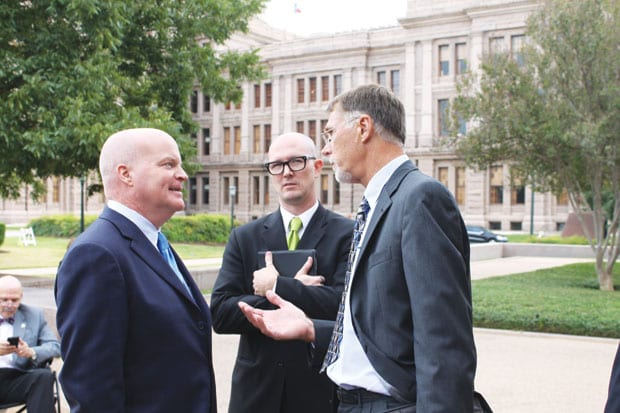Lawyer, attorney general battle it out before the justices in cases that could decide if same-sex couples can dissolve out-of-state unions

FINALLY HEARD | Jody Scheske, left, the attorney representing the two same-sex couples, speaks to people after the arguments on Tuesday, Nov. 5, outside the Texas Supreme Court. Justices are expected to issue a ruling in the cases by summer. (Anna Waugh/Dallas Voice)
AUSTIN — The legal differences between states that recognize same-sex marriage and those that don’t collided in the Texas Supreme Court on Tuesday.
Two same-sex couples who married in Massachusetts but now live in Texas want to divorce, but Texas Attorney General Greg Abbott is fighting it, arguing same-sex couples in Texas can’t divorce because the state doesn’t recognize their marriages.
Jody Scheske, the attorney for the two couples, H.B. and J.B. of Dallas and Angelique Naylor and Sabrina Daly of Austin, focused his arguments on the validity of their marriages in another state. He further highlighted that only the parties petitioning for a divorce, and not the state, have a right to contest it.
The Austin couple was granted a divorce in a lower court. Abbott intervened and filed in the Third Court of Appeals, but the lower court’s decision was upheld. Abbott then appealed that decision to the Supreme Court. According to documents obtained by Dallas Voice, Abbott has spent $189,912.08 fighting the cases from January 2009 to July 2013.
A 2011 law allows the state attorney general to intervene in cases that challenge the constitutionality of a statute. Deputy Attorney General James Blacklock, representing the state, argued the constitutionality of the state’s ban on same-sex marriage was brought into the cases by the previous judges’ rulings. He said the state was, therefore, justified to intervene and defend state law, which doesn’t recognize the same-sex couples’ marriages for any purpose.
Justice Don Willett asked if a state has to first recognize a marriage before granting a divorce, later mentioning that Georgia has a marriage amendment but allows same-sex divorce. But Scheske said the couples’ marriages are valid in Massachusetts, and Texas laws relate to marriage, not divorce, and don’t apply. He added the “treatment of Texas to those marriages doesn’t change their validity.”
In the matter of jurisdiction, Scheske said the state family code doesn’t specify jurisdiction.
Blacklock said both parties have challenged the constitutionality of Texas’ law in their cases. Therefore, the attorney general has standing to defend the law.
“There is no way to grant a divorce without recognizing a marriage,” Blacklock said.
Justices brought up property and other rights, questioning how assets could be divided when a union ends without a legal process.
Blacklock said the assets would be divided in a way to appease the parties. When asked about children, he said the Austin couple has a child, but the case doesn’t deal with a child-parent relationship.
The issue of taxes also was raised. Married same-sex couples in Texas can file joint taxes because the federal government recognizes the marriage in light of the U.S. Supreme Court’s ruling on the Defense of Marriage Act.
Blacklock said the marriages were void in the state for every purpose.
Paul Castillo, staff attorney at Lambda Legal’s Dallas office, said the justices asked questions about the “practical realities” of same-sex couples married in other states but live in Texas.
“I was encouraged by some of the questions that made it appear they are cognizant of divorce is in fact different than marriage,” he said.
Castillo said the court was likely pressured to hear the cases because of the different decisions by lower appeals courts.
He said the focus on dividing property and how the outcome would affect children involved were important to the impending decision, but he said it’s hard to know how the all-Republican court will rule.
“I’m cautious about any sort of predictions when it comes to oral arguments because that’s inevitably not an accurate predictor of how the court will rule,” Castillo said.
Dallas attorney Peter Schulte, who represented J.B. in district court, said he was optimistic about the arguments.
“Whatever they do, I think it’s going to have to affect the broader base,” he said. “I think the court was very concerned about more cases coming before them. …They really just want to resolve this issue.”
Scheske later said the Dallas couple has been living apart since 2008. He added that if the Supreme Court sides with the state in the Austin case, the decision would remarry the couple, who have considered themselves divorced for four years.
“There’s no question that my clients were married,” he said. “And the only place they can resolve that marriage is their state of residence.”
Jonathan Saenz, president of conservative group Texas Values, said he thought the court would rule in favor of the state’s marriage statute and not allow the couples to divorce.
“It’s clear that this couple and other couples are trying to use divorce as a mechanism to undo our marriage laws, and I don’t think the Texas Supreme Court is going to let that happen,” Saenz said.
The court doesn’t have a deadline to issue a decision, but Scheske said he expects a decision by the spring or as late as the summer when the court recesses.
“You really can’t tell what the court’s going to do,” he said. “We intend to prevail. I believe that’s what will happen.”
For more details about the oral arguments, go here.
This article appeared in the Dallas Voice print edition November 8, 2013.

